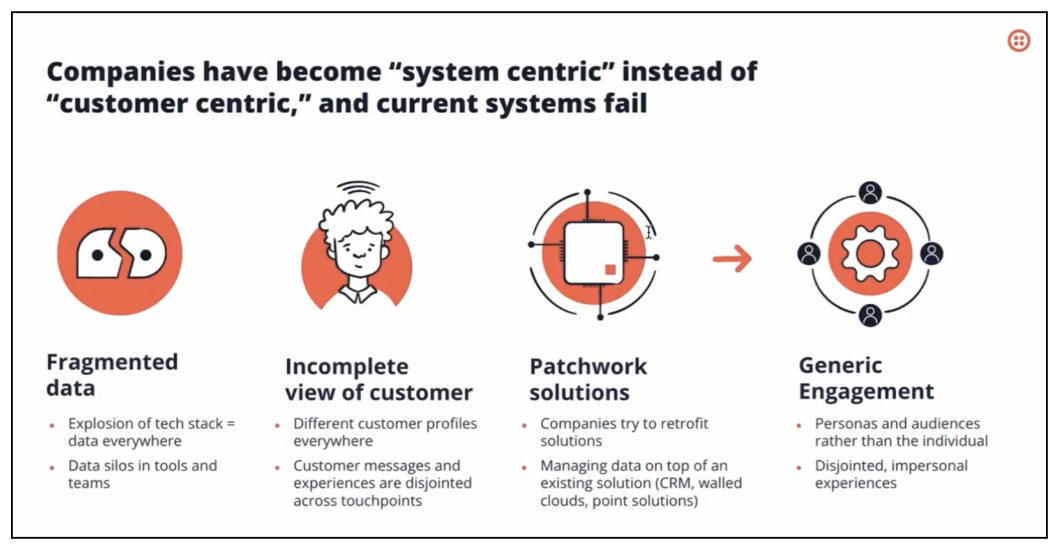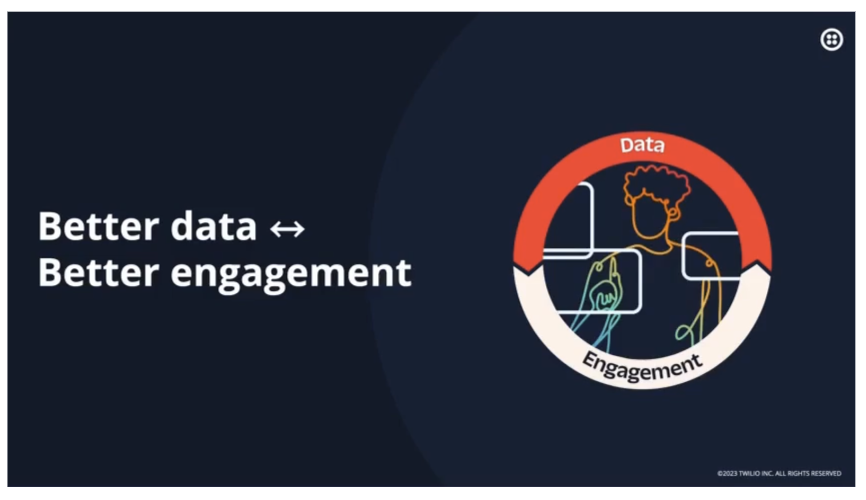3 things we learned at CDP Week 2023: AI Edition
At CDP Week 2023, we looked at how AI trends are shaping customer experiences. Here's the recap.
At CDP Week 2023, we looked at how AI trends are shaping customer experiences. Here's the recap.
This year, over 5,000 people registered for CDP Week: AI Edition, our virtual, three-day conference to discuss current and emerging industry trends.
Powering impactful, AI-driven strategies is top of mind for innovative businesses around the world. So, at this year’s summit, we showcased how businesses can leverage trusted data using a CDP to unlock the full potential of AI - and what that means for companies moving forward.
Throughout the week’s keynotes, roundtables, and fireside chats, one underlying concept emerged: today, every company is in the business of customer experience. And, AI will be a driving force behind customer engagement.
Below are three key takeaways from CDP Week: AI Edition, a mix of tactics and strategies to help companies navigate in a world where artificial intelligence is dominating the business landscape.
Companies strive to put customers at the heart of their business, but ever-expanding tech stacks and patchwork solutions have caused many companies to become “system centric” instead of “customer centric”. This has led to siloed data, an incomplete view of the customer and, ultimately, disjointed experiences that leave customers frustrated.
Jeff Lawson, CEO of Twilio, shared that in order to truly be “customer centric,” a business must be able to understand and adapt to the unique wants and needs of every individual customer as they change moment to moment.
Let’s look at why companies have shifted from a customer-centric to a system-centric focus.
The most obvious reason is the desire for operational efficiency and cost reduction. Companies may prioritize internal processes and systems to streamline operations and reduce costs. This focus on efficiency sometimes leads to a shift away from customer-centric practices, as the emphasis is on optimizing internal functions.
Further, the adoption of new technologies and systems can sometimes become an end in itself. Companies may prioritize implementing the latest software or automation tools without adequately considering their impact on the customer experience.

With the rise of big data and analytics, companies may also become overwhelmed with information. While data is valuable for decision-making, an overemphasis on data-driven processes can result in decisions that prioritize systems and metrics over customer needs and preferences.
This leads to another issue – organizational silos. Large organizations with complex structures may develop silos, where different departments or teams focus on their specific functions without sufficient collaboration. This can lead to a disconnect between the various parts of the company and hinder a holistic, customer-centric approach.
Another factor is where a company places its focus. Some companies may prioritize short-term profits over long-term customer relationships. This can lead to decisions that prioritize cost-cutting and efficiency gains at the expense of customer satisfaction and loyalty.
Lastly, leadership priorities and a lack of a customer-centric culture could be at play. Priorities set at the top can influence the entire organization. If leadership places a strong emphasis on system optimization and cost reduction without balancing it with a focus on customer satisfaction, the organization is likely to follow suit.
A successful business strategy often involves finding the right balance between operational efficiency and customer-centricity. Many companies, including Twilio Segment, recognize the importance of putting the customer at the center of their operations to build long-term relationships and ensure sustained success.
"Adaptive AI" refers to artificial intelligence systems that can adjust and improve their performance based on experience and changing conditions. These systems can learn from new data, adapt to different scenarios, and continuously enhance their capabilities over time.
Adaptive AI is making customer engagement more personalized, efficient, and predictive. By leveraging advanced technologies to tailor interactions, predict customer behavior, and enhance the overall customer experience, businesses that effectively implement adaptive AI technologies can create more meaningful connections with their customers.
It’s no surprise that 92% of companies are already using AI-powered personalization to accelerate growth.
However, successful AI-driven engagement is only as good as your data. It’s imperative that businesses' data foundations are equipped with trusted data to power precise, 1:1 customer interactions, and predict customer wants that can be activated in real time at scale.

Adaptive AI also has the power to predict customer needs and behaviors based on historical data and real-time analysis. By identifying patterns and trends, businesses can proactively address customer issues, offer relevant solutions, and even anticipate future needs.
It can also help businesses optimize the customer journey by analyzing data from various touchpoints. This allows companies to identify pain points, streamline processes, and create a more seamless and personalized experience throughout the entire customer lifecycle.
In addition, adaptive AI can automatically identify customer segmentation. Algorithms can segment customers into more granular and meaningful groups based on their behavior, demographics, and preferences. This enables businesses to target specific customer segments with personalized marketing strategies.
Sinead Bovell, a renowned AI expert, visionary and entrepreneur, sat down for a fireside chat alongside Twilio VP of Product, Robin Grochol, to talk about the intricate connections between technology, society, and business.
The discussion turned to how AI is acting as a powerful accelerant, augmenting our existing capabilities, streamlining tasks, and enabling efficiency; from using it in our day-to-day tasks to personalized product recommendations to autonomous vehicles.
"The impact of AI is not only limited to making our lives more efficient and convenient, but with the emergence of ChatGPT, we are experiencing how AI technologies can disrupt various industries and present endless opportunities for innovation,” said Sinead.
In addition to the important role that AI plays in assisting employees – such as automating repetitive tasks so individuals can focus on more strategic and creative aspects of their work – AI is helping us find solutions to the biggest challenges facing society, such as environmental sustainability, and leveling the educational playing field. It can also help us move away from a healthcare ecosystem of managing illness toward prevention and maintaining wellness by using applications such as diagnostics, drug discovery, and personalized medicine. Virtual health assistants and remote monitoring systems can also improve patient care and reduce costs.

In terms of climate change, AI can help with prediction and forecasting by using data gathered from early warning systems and extreme weather warnings. For example, it can improve climate modeling and prediction by analyzing large datasets and identifying complex patterns. This helps scientists and policymakers better understand climate change dynamics, assess potential impacts, and develop strategies for mitigation and adaptation.
When it comes to agriculture, AI is helping farmers to reduce pesticide usage by up to 80% on some farms, leading to healthier crops and cost savings. It’s also improving the food supply by determining, for example, how avocado trees can grow more fruit with less water so there’s minimal strain on the environment. And scientists are using AI to uncover plastic-eating enzymes that can be deployed into the oceans to protect wildlife impacted by floating plastics.
A strong economy relies on an educated and skilled workforce. Yet, the educational system we use today was largely designed during the Industrial Revolution, where one teacher instructs 30 students about the same topic. Because a student’s learning style and where he or she is in their learning journey is unique, AI can enable teachers and schools to create customization at scale.
Imagine a teacher giving a test where questions are personalized for each student based on their background or interests, while still ensuring that students come up with the same answer. Only the way the question is asked changes, tailoring it to a student’s life experience and strengths. AI can also provide tutoring to help students learn – in a sort of chatbot environment – so they can better understand the material without a teacher needing to spend 1:1 time with each student.
We covered a lot of ground at this year’s CDP Week – and the takeaways above are just some of the highlights. To dive deeper into these topics, register for free to watch all the videos from CDP Week: AI Edition here.

Our annual look at how attitudes, preferences, and experiences with personalization have evolved over the past year.